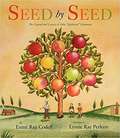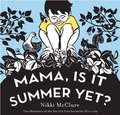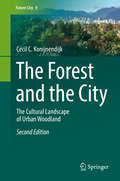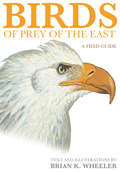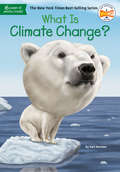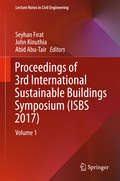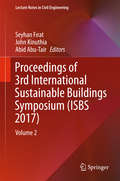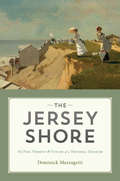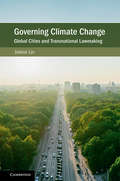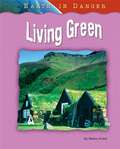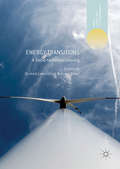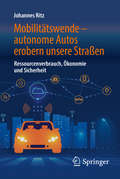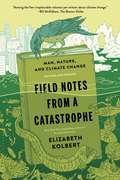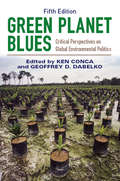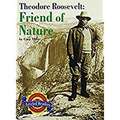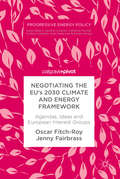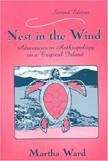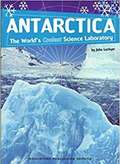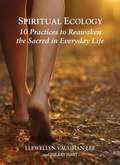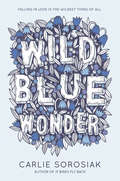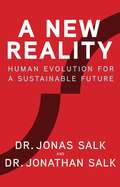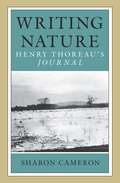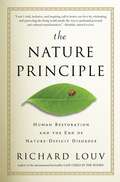- Table View
- List View
Seed by Seed: The Legend and Legacy of John "Appleseed" Chapman
by Esme Raji Codell<p>His real name was John Chapman. He grew apples. <p>But wait. So what? Why should we remember him? And read about him? And think about him? And talk about him today, more than two hundred years after he was born? Why should we call him a hero? <p>Esme Raji Codell and Lynne Rae Perkins show us, in eloquent words and exhilarating pictures, why Johnny Appleseed matters now, perhaps more than ever, in our loud and wired and fast-paced world.</p>
Mama, Is It Summer Yet?
by Nikki McClureAs spring slowly turns to summer, a little boy builds a fort and plant a garden in impatient anticipation in this book.
The Forest and the City: The Cultural Landscape Of Urban Woodland
by Cecil C. KonijnendijkAmsterdamse Bos, Bois de Boulognes, Epping Forest, Hong Kong’s country parks, Stanley Park: throughout history cities across the world have developed close relationships with nearby woodland areas. In some cases, cities have even developed – and in some cases are promoting – a distinct ‘forest identity’. This book introduces the rich heritage of these city forests as cultural landscapes, and shows that cities and forests can be mutually beneficial.Essential reading for students and researchers interested in urban sustainability and urban forestry, this book also has much wider appeal. For with city forests playing an increasingly important role in local government sustainability programs, it provides an important reference for those involved in urban planning and decision making, public affairs and administration, and even public health. From providers of livelihoods to healthy recreational environments, and from places of inspiration and learning to a source of conflict, the book presents examples of city forests from around the world. These cases clearly illustrate how the social and cultural development of towns and forests has often gone hand in hand. They also reveal how better understanding of city forests as distinct cultural and social phenomena can help to strengthen synergies both between cities and forests, and between urban society and nature.
Birds of Prey of the East: A Field Guide
by Brian K. WheelerBirds of Prey of the East and its companion volume, Birds of Prey of the West, are the most comprehensive and authoritative field guides to North American birds of prey ever published. Written and lavishly illustrated with stunning, lifelike paintings by leading field-guide illustrator, photographer, and author Brian Wheeler, the guides depict an enormous range of variations of age, sex, color, and plumage, and feature a significant amount of plumage data that has never been published before. The painted figures illustrate plumage and species comparisons in a classic field-guide layout. Each species is shown in the same posture and from the same viewpoint, which further assists comparisons. Facing-page text includes quick-reference identification points and brief natural history accounts that incorporate the latest information. The range maps are exceptionally accurate and much larger than those in other guides. They plot the most up-to-date distribution information for each species and include the location of cities for more accurate reference. Finally, the guides feature color habitat photographs next to the maps. The result sets a new standard for guides to North America's birds of prey.Lavishly illustrated with stunning, lifelike paintingsWritten and illustrated by a leading authority on North American birds of preyDepicts more plumages than any other guideConcise facing-page text includes quick-reference identification pointsClassic field-guide layout makes comparing species easyLarge, accurate range maps include up-to-date distribution informationUnique color habitat photographs next to the maps
What Is Climate Change? (What Was?)
by Gail Herman John Hinderliter Who HqLearn more about what climate change means and how it's affecting our planet.The earth is definitely getting warmer. There's no argument about that, but who or what is the cause? And why has climate change become a political issue? Are humans at fault? Is this just a natural development? While the vast majority of scientists who study the environment agree that humans play a large part in climate change, there is a counterargument. Author Gail Herman presents both sides of the debate in this fact-based, fair-minded, and well-researched book that looks at the subject from many perspectives, including scientific, social, and political.
Proceedings of 3rd International Sustainable Buildings Symposium: Volume 2 (Lecture Notes in Civil Engineering #7)
by Seyhan Fırat John Kinuthia Abid Abu-TairThis book describes the latest advances, innovations, and applications in the field of building design, environmental engineering and sustainability as presented by leading international researchers, engineers, architects and urban planners at the 3rd International Sustainable Buildings Symposium (ISBS), held in Dubai, UAE from 15 to 17 March 2017. It covers highly diverse topics, including smart cities, sustainable building and construction design, sustainable urban planning, infrastructure development, structural resilience under natural hazards, water and waste management, energy efficiency, climate change impacts, life cycle assessment, environmental policies, and strengthening and rehabilitation of structures. The contributions amply demonstrate that sustainable building design is key to protecting and preserving natural resources, economic growth, cultural heritage and public health. The contributions were selected by means of a rigorous peer-review process and highlight many exciting ideas that will spur novel research directions and foster multidisciplinary collaboration among different specialists.
Proceedings of 3rd International Sustainable Buildings Symposium: Volume 2 (Lecture Notes in Civil Engineering #7)
by Seyhan Fırat John Kinuthia Abid Abu-TairThis book describes the latest advances, innovations, and applications in the field of building design, environmental engineering and sustainability as presented by leading international researchers, engineers, architects and urban planners at the 3rd International Sustainable Buildings Symposium (ISBS), held in Dubai, UAE from 15 to 17 March 2017. It covers highly diverse topics, including smart cities, sustainable building and construction design, sustainable urban planning, infrastructure development, structural resilience under natural hazards, water and waste management, energy efficiency, climate change impacts, life cycle assessment, environmental policies, and strengthening and rehabilitation of structures. The contributions amply demonstrate that sustainable building design is key to protecting and preserving natural resources, economic growth, cultural heritage and public health. The contributions were selected by means of a rigorous peer-review process and highlight many exciting ideas that will spur novel research directions and foster multidisciplinary collaboration among different specialists.
The Jersey Shore: The Past, Present & Future of a National Treasure
by Dominick MazzagettiIn The Jersey Shore, Dominick Mazzagetti provides a modern re-telling of the history, culture, and landscapes of this famous region, from the 1600s to the present. The Shore, from Sandy Hook to Cape May, became a national resort in the late 1800s and contributes enormously to New Jersey’s economy today. The devastation of Hurricane Sandy in 2012 underscored the area’s central place in the state’s identity and the rebuilding efforts after the storm restored its economic health. Divided into chronological and thematic sections, this book will attract general readers interested in the history of the Shore: how it appeared to early European explorers; how the earliest settlers came to the beaches for the whaling trade; the first attractions for tourists in the nineteenth century; and how the coming of railroads, and ultimately automobiles, transformed the Shore into a major vacation destination over a century later. Mazzagetti also explores how the impact of changing national mores on development, race relations, and the environment, impacted the Shore in recent decades and will into the future. Ultimately, this book is an enthusiastic and comprehensive portrait by a native son, whose passion for the region is shared by millions of beachgoers throughout the Northeast.
Governing Climate Change: Global Cities and Transnational Lawmaking (Cambridge Studies on Environment, Energy and Natural Resources Governance)
by Jolene LinCities are no longer just places to live in. They are significant actors on the global stage, and nowhere is this trend more prominent than in the world of transnational climate change governance (TCCG). Through transnational networks that form links between cities, states, international organizations, corporations, and civil society, cities are developing and implementing norms, practices, and voluntary standards across national boundaries. In introducing cities as transnational lawmakers, Jolene Lin provides an exciting new perspective on climate change law and policy, offering novel insights about the reconfiguration of the state and the nature of international lawmaking as the involvement of cities in TCCG blurs the public/private divide and the traditional strictures of 'domestic' versus 'international'. This illuminating book should be read by anyone interested in understanding how cities - in many cases, more than the countries in which they're located - are addressing the causes and consequences of climate change.
Living Green (Earth in Danger)
by Helen OrmeFrom hybrid cars to energy-efficient light bulbs, the green movement has generated interest in lifestyle changes that help preserve and protect the environment. Living Green pairs easy-to-read text with vibrant photos to engage kids as they explore ways to maintain our natural resources for future generations. A section in the back of the book will inspire young environmentalists by suggesting ways they can help protect their planet.
Energy Transitions
by Alain Nadaï Olivier LabussièreThis book elucidates what it means to transition to alternative sources of energy and discusses the potential for this energy transition to be a more democratic process. The book dynamically describes a recent sociotechnical study of a number of energy transitions occurring in several countries - France, Germany and Tunisia, and involving different energy technologies - including solar, on/off-shore wind, smart grids, biomass, low-energy buildings, and carbon capture and storage. Drawing on a pragmatist tradition of social inquiry, the authors examine the consequences of energy transition processes for the actors and entities that are affected by them, as well as the spaces for political participation they offer. This critical inquiry is organised according to foundational categories that have defined the energy transition - ‘renewable’ energy resources, markets, economic instruments, technological demonstration, spatiality (‘scale’) and temporality (‘horizon(s)’). Using a set of select case studies, this book systematically investigates the role these categories play in the current developments in energy transitions.
Mobilitätswende – autonome Autos erobern unsere Straßen
by Johannes RitzDieses Buch beleuchtet die unterschiedlichen Facetten einer Mobilität mit selbstfahrenden (autonomen) Fahrzeugen. Angefangen bei der Elektromobilität, werden die Parkplatzproblematik, Carsharing und Haftungsfragen unter dem Aspekt einer zunehmenden Verbreitung autonomer Fahrzeuge betrachtet. Auch ökonomische und umweltpolitische Fragen sind aufgeworfen (Ressourcenknappheit, Klimawandel, automatisierte Logistik) und versucht zu beantworten. Können Maschinen moralisch handeln, wie steht es um die Cybersicherheit und den Technikmissbrauch, sind weitere Fragen, die in diesem Buch thematisiert werden.
Field Notes from a Catastrophe: Man, Nature, and Climate Change
by Elizabeth KolbertThis description of the realities of global warming is a passionate plea for action whilst there is still time. The author approaches global warming from all angles, visiting the Artic, the North of England, Holland and Puerto Rico, interviewing researchers and environmentalists and explaining the science and the studies.
Green Planet Blues: Critical Perspectives on Global Environmental Politics (5th Edition)
by Ken Conca Geoffrey D. Dabelko<p>Revised and updated throughout, this unique anthology examines global environmental politics from a range of perspectives (contemporary and classic, activist and scholarly) and reflects voices of the powerless and powerful. Paradigms of sustainability, environmental security, and ecological justice illustrate the many ways environmental problems and their solutions are framed in contemporary international debates about climate, water, forests, toxics, energy, food, biodiversity, and other environmental challenges of the twenty-first century. Organized thematically, the selections offer a truly global scope. Seventeen new readings discuss climate justice, environmental peacebuilding, globalization, land grabs, corporate environmentalism, climate adaptation, gender, disaster risk, resilience, and the future of global environmental politics in the wake of the 'Rio+20' global summit of 2012. <p>This book stresses the underlying questions of power, interests, authority, and legitimacy that shape environmental debates, and it provides readers with a global range of perspectives on the critical challenges facing the planet and its people.</p>
Treasure in the Trees
by Christopher ChengTreasure in the Trees explores the beauty of nature and science.
Theodore Roosevelt: Friend of Nature (Leveled Readers )
by Gary MillerAll his life, Theodore Roosevelt worked to understand and to preserve nature. As you read, stop every so often to evaluate how well the author tells about Theodore Roosevelt's life.
Negotiating the EU’s 2030 Climate and Energy Framework: Agendas, Ideas And European Interest Groups (Progressive Energy Policy Ser.)
by Oscar Fitch-Roy Jenny FairbrassIn 2014, European heads of state selected new targets for the EU as part of the 2030 climate and energy framework. These targets will guide the ambition and nature of EU policy in this area until 2030 and are likely to have important implications for Europe’s transition to a low-carbon economy. This book exposes the role of civil society and business interest groups in setting the policymaking agenda and defining the range of options for the framework. Based on a unique sample of 32 in-depth interviews with Brussels policy elites, this book casts EU interest representation in a new light. In a novel application of the ‘multiple streams approach’, sequential chapters present the problems faced by policymakers, the range of policy options available to address them and the political constraints within which policy entrepreneurs attempted to attached policies to problems.
Nest in the Wind: Adventures in Anthropology on a Tropical Island (2nd Edition)
by Martha WardDuring her first visit to the beautiful island of Pohnpei in the middle of the Pacific Ocean, anthropologist Martha Ward discovered people who grew quarter-ton yams in secret and ritually shared a powerful drink called kava. She managed a medical research project, ate dog, became pregnant, and responded to spells placed on her. Thirty years later she returned to Pohnpei to learn what had happened there since her first visit. Were islanders still casual about sex? Were they still obsessed with titles and social rank? Was the island still lush and beautiful? Had the inhabitants remained healthy? This second edition of Ward's best-selling account is a rare, longitudinal study that tracks people, processes, and a place through decades of change. It is also an intimate record of doing fieldwork that immerses readers in the sights, smells, tastes, sounds, and the sensory richness of Pohnpei. Ward addresses the ageless ethnographic questions about family life, politics, religion, traditional medicine, magic, and death together with contemporary concerns about postcolonial survival, the discontinuities of culture, and adaptation to the demands of a global age. Her discoveries illuminate the evolution of a culture possibly distant from yet important to people living in other parts of the world.
Antarctica: The World's Coolest Science Laboratory
by John LockyerAntarctica: The World's Coolest Science Laboratory by John Lockyer.
Spiritual Ecology: 10 Practices to Reawaken the Sacred in Everyday Life
by Llewellyn Vaughan-Lee Hilary Hart<i>Spiritual Ecology: 10 Practices to Reawaken the Sacred in Everyday Life</i> offers inspiring and practical guidance for reconnecting to the sacred in every day life and transforming our relationship with the Earth. Describing the power of simple, daily practices such as Walking, Gardening, Cooking with Love, and Prayer, this small book supports profound changes in how we think about and respond to the ecological crisis of our times.
Wild Blue Wonder
by Carlie SorosiakLast June, the summer camp Quinn’s family owns in Winship, Maine, was still a magical place. A place where wild blueberries grew no matter the season, a legendary sea monster lurked in the waters, and Quinn fell in love with her best friend, Dylan. Then the accident happened. Now it’s winter, the magic has drained from Quinn’s life, and she knows it’s her fault. But the new boy in town, Alexander, doesn’t see her as the monster she believes herself to be. As Quinn lets herself open up again, she begins to understand the truth about love, loss, and monsters—real and imagined. This wondrous novel about love, loss, and moving on is perfect for fans of Morgan Matson and Jenny Han.
A New Reality: Human Evolution for a Sustainable Future
by Jonas Salk Jonathan Salk David Dewane Elizabeth H BlackburnA New Reality: Human Evolution for a Sustainable Future provides a startling, fresh new message of understanding, perspective and hope for today’s tense, rapid-fire, kaleidoscopically changing world. A New Reality: Human Evolution for a Sustainable Future provides a startling, fresh new message of understanding, perspective and hope for today’s tense, rapid-fire, kaleidoscopically changing world. Drawn from the writings of visionary scientist Jonas Salk, who developed the polio vaccine, extended and developed by his son Jonathan, the message of the book explodes from the past and sheds light on tensions that besiege us and the currents of discord that are raging as these words are written. More importantly, it indicates a way forward out of our current situation. Written by a world-famous doctor and folk hero, based on population data, rich in visual imagery, elegantly designed, and clearly written, A New Reality is unique in the marketplace. Readable in one or two sittings, it is accessible to the general reader while at the same time being of essential value to policy makers and academics. Its brevity and simplicity of design belie the importance and sophistication of its message. “We are at a point in the course of human social evolution when the demands of survival converge with the higher ideals of humankind and the well-being and flourishing of human society. It is up to us to see that we navigate this transition, adapting to and emerging in a new reality.” —A New Reality Our country is divided and polarized. Terrorism is a major threat throughout much of the world. Mass migrations are causing national and international tension. Population growth continues to increase, especially in the developing regions of the world. Controversy rages as to the use of fossil fuels versus the development of alternative forms of energy. Disagreement continues about climate change. Opposing currents of opinion collide as to how much we should help other areas in the world and how much to help ourselves. Basic values are in conflict. More than 40 years ago, Jonas Salk understood that we are at a unique moment in the history of the human species. After centuries of increase, population growth has begun to slow and is trending toward equilibrium. This change is accompanied by an equally significant change in human values—a shift from those based on unlimited availability of resources, unremitting growth, excess, independence, competition and short-term thinking to those based on limits, equilibrium, balance, interdependence, cooperation and long-term thinking. This momentous transition is the source of far-reaching tension and conflict. The way through this difficult era is to understand its basis and to focus on new values that will be of the greatest benefit to humankind. There is an urgency, however, and failure to adapt will result in disaster both for humanity and for the planet as a whole. A New Reality delivers a message of both caution and hope. Readers across the social and political spectrum will find it a reasoned and balanced counterpoint to current social and political trends. Its elegant design and long-range perspective will appeal to general readers, policy makers, millennials, baby boomers, teachers, and students, filling a need in the marketplace for a work of positivity and wisdom in otherwise bleak times.
Writing Nature: Henry Thoreau's Journal
by Sharon CameronAt his death, Henry Thoreau left the majority of his writing unpublished. The bulk of this material is a journal that he kept for twenty-four years. Sharon Cameron's major claim is that this private work (the Journal) was Thoreau's primary work, taking precedence over the books that he published in his lifetime. Her controversial thesis views Thoreau's Journal as a composition that confounds the distinction between public and private--the basis on which our conventional treatment of discourse depends.
The Nature Principle: Human Restoration and the End of Nature-Deficit Disorder
by Richard LouvIn this book the author argues that a strong connection to nature is essential for human health. Supported by research, anecdotal evidence, and personal stories, the author shows how tapping into the restorative powers of the natural world can boost mental acuity and creativity; promote health and wellness; build smarter and more sustainable businesses, communities, and economies; and ultimately strengthen human bonds. He outlines seven precepts he calls the "Nature Principle", which include balancing technology excess with time in nature; a mind/body/nature connection, which he calls "vitamin N," that enhances physical and mental health; expanding our sense of community to include all living things; and purposefully developing a spiritual, psychological, physical attachment to a region and its natural history.
These Rocks Count!
by Sarah Snow Alison FormentoMr. Tate's class is about to learn that there's more to rocks than being dirty lumps on the ground. On this field trip they're visiting the rocky ridge mountains to learn about rocks. At first the children think rocks will be boring, but they soon learn that rocks are all around us in ways we might not expect--such as glass and toothpaste! This is a fixed-format ebook, which preserves the design and layout of the original print book.
